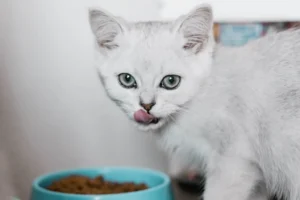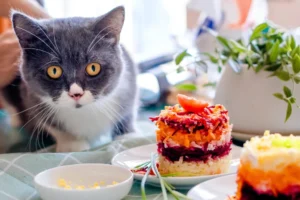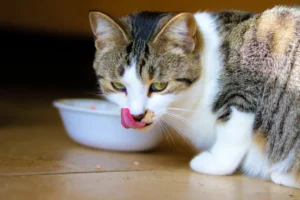Have you ever wondered why your finicky feline turns up their nose at the sight of salmon? It’s a common question among cat owners, and the answer may surprise you.
Your cat may not like salmon due to their individual taste preferences, texture sensitivities, or even past negative experiences with the food.
Cat Taste Preferences
Cats are notorious for being picky eaters, and their taste preferences have evolved over thousands of years. Cats are obligate carnivores, meaning they require a diet primarily made up of meat to thrive. Their taste buds are tuned to detect meaty flavors like sour or bitter tastes, which are often found in meat proteins. This might explain why your feline friend turns up their nose at salmon, as the taste might not align with their evolutionary preferences. Cats also have a heightened sensitivity to bitter tastes, which are more prominent in foods like fish. So, if your cat snubs their nose at salmon, it might just be their taste buds telling them it’s not their cup of tea.
Texture Sensitivities
When it comes to texture, cats can be just as particular as humans. Salmon has a distinct texture that might not sit well with your furry friend. Cats tend to prefer moist and soft foods over dry or crunchy textures. Salmon, with its flaky and sometimes slippery texture, may not appeal to your cat’s preferences. Additionally, cats are known to have sensitive mouths and palates, so the texture of salmon could be a turn-off for them. If your cat isn’t a fan of the texture of salmon, it might be worth trying other meaty options that cater to their texture preferences, such as chicken or turkey.
- Helpful tip: If your cat doesn’t like salmon, try cooking or mixing it with their other favorite foods to see if they develop a taste for it. Sometimes, it’s all about finding the right combination that appeals to their unique preferences.
Negative Experiences
If your cat doesn’t like salmon, it could stem from negative experiences with fish-based foods in the past. Maybe they had a bad reaction, didn’t enjoy the taste, or experienced digestive issues. Cats, like humans, can develop preferences based on past encounters. It’s essential to respect your cat’s preferences and explore other protein options that they might prefer. Keep in mind that every cat is unique, and what works for one may not work for another.
Alternative Protein Sources
Apart from salmon, there are various protein sources you can offer your cat to ensure they get the essential nutrients they need. Some alternatives to salmon include chicken, turkey, beef, and even plant-based proteins like peas or lentils. These options can provide a well-rounded diet for your cat while catering to their taste preferences. Remember to consult with your veterinarian to ensure your cat’s dietary needs are being met with these alternative protein sources.
Additional Unique Insight: Consider rotating protein sources in your cat’s diet to keep things interesting for them. Cats can get bored with the same food every day, so offering a variety of protein sources can help prevent mealtime monotony and ensure they are getting a diverse range of nutrients.
By understanding your cat’s preferences and exploring alternative protein options, you can ensure they have a balanced and enjoyable diet that keeps them healthy and happy.
Gradual Introductions
Hey there! If your finicky feline isn’t a fan of salmon, no need to worry. You can try introducing it slowly into their diet. Mix a small amount of salmon with their regular food, gradually increasing the ratio over time. This gentle approach can help your cat get used to the new flavor and texture without feeling overwhelmed. Remember, patience is key when it comes to changing your cat’s diet. Before you know it, your cat might just come around to enjoying some scrumptious salmon!
Unique Insight: Cats are creatures of habit, so sudden changes in their diet can be off-putting. By gradually introducing salmon, you’re giving your cat the chance to adjust at their own pace.
Consult Your Vet
Hey, friend! If your cat continues to turn their nose up at salmon or other foods, it’s essential to chat with your vet. This behavior could signal an underlying health issue that needs attention. Your vet can rule out any medical concerns and provide guidance on the best way to address your cat’s picky eating habits. Remember, your cat’s health always comes first, so don’t hesitate to seek professional advice if needed.
For more information on feline nutrition and dietary needs, check out this resource from the American Association of Feline Practitioners: Feline Nutrition Guidelines.
Fun Facts about Cats and Food
Did you know that cats are obligate carnivores, meaning their diet needs to be mostly meat-based to stay healthy and satisfied? This unique biological need explains why your feline friend may not be too keen on salmon, as their taste preferences are different from ours. While many cats do enjoy fish, some may not fancy the taste of salmon for various reasons.
One interesting tidbit is that cats actually have fewer taste buds compared to humans, which can impact their food preferences. So, if your cat is turning up their nose at that salmon dish, it might be because the flavor profile doesn’t align with their preferences. Don’t worry; there are plenty of other options to keep your furry friend happy and healthy.
Alex, a passionate animal lover, has experience in training and understanding animal behavior. As a proud pet parent to two dogs and three cats, he founded AnimalReport.net to share insights from animal experts and expand his knowledge of the animal kingdom.




